Serie - Teacup : An Uneven Blend of Sci-Fi Horror and Family Drama, Anchored by Strong Performances
By Mulder, 10 october 2024
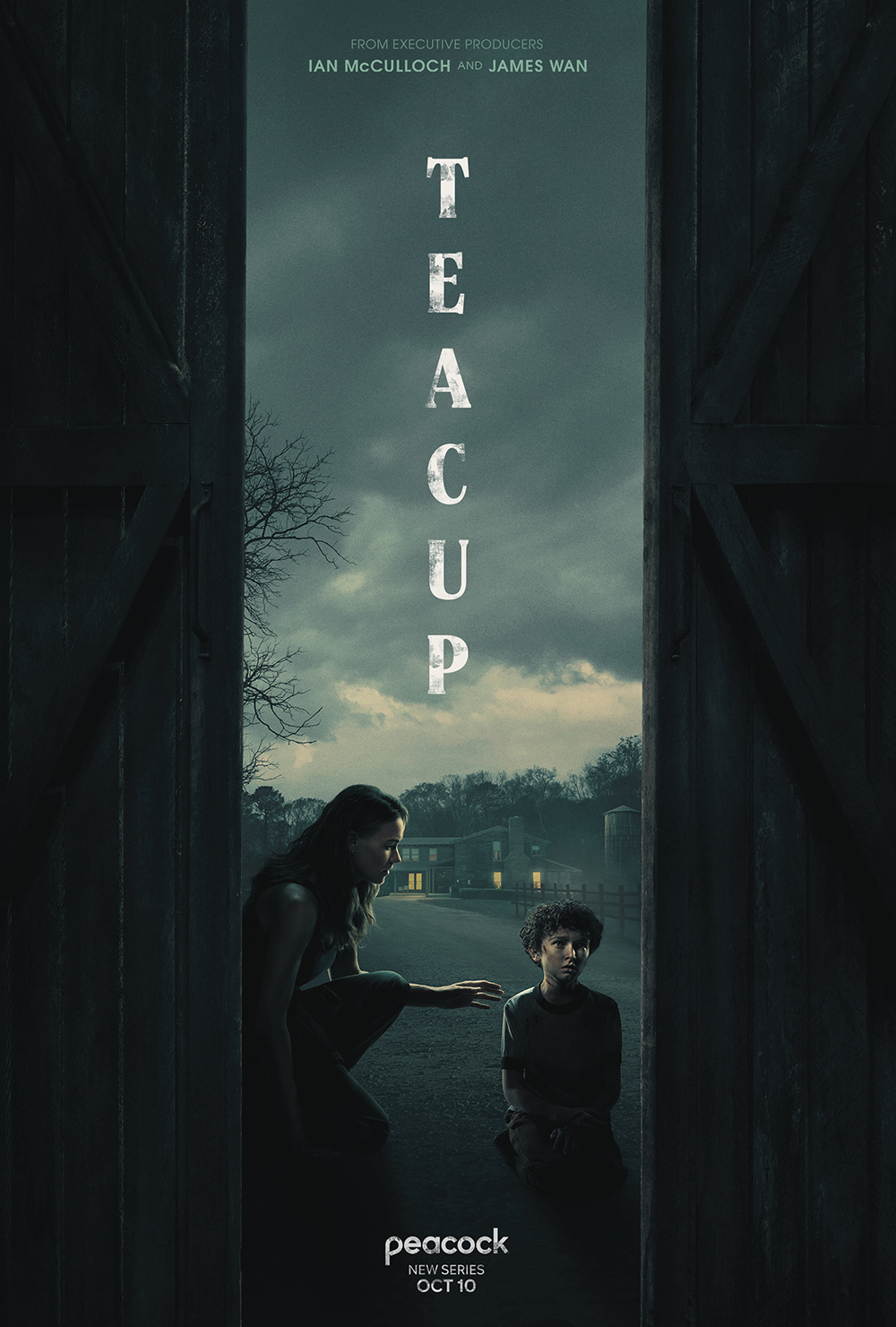
Teacup, the Peacock Original sci-fi horror series helmed by Ian McCulloch, offers an intriguing setup that grips you from the very first episode. The show adapts Stinger, Robert R. McCammon’s 1988 novel, taking a small Georgia farm as the epicenter of an alien invasion thriller. On paper, the series boasts all the right ingredients—an isolated setting, a creeping supernatural menace, and an ensemble cast led by the ever-compelling Yvonne Strahovski. However, despite its strong start and moments of genuine tension, Teacup falters as it struggles to balance its ambitious blend of horror, sci-fi, and personal drama. Over the course of its eight-episode run, the show leans heavily on genre tropes, and while it delivers some standout performances and eerie visuals, it ultimately stumbles under the weight of its own ambitions.
The narrative centers on the Chenoweth family, led by Maggie Chenoweth (Yvonne Strahovski), a veterinarian who is fiercely protective of her two children, Meryl (Émilie Bierre) and Arlo (Caleb Dolden). The family’s rural life is thrown into disarray when mysterious events begin to unfold on their farm. The electricity cuts out, animals act erratically, and a man in a gas mask, McNab (Rob Morgan), appears, warning the family never to cross a blue line he’s drawn around their property. Adding to the tension is Maggie’s strained relationship with her husband, James (Scott Speedman), whose infidelity with their neighbor Valeria Shanley (Diany Rodriguez) has cast a shadow over their marriage. This intricate web of personal drama is juxtaposed against the show’s larger supernatural plot, which gradually morphs into an alien invasion mystery.
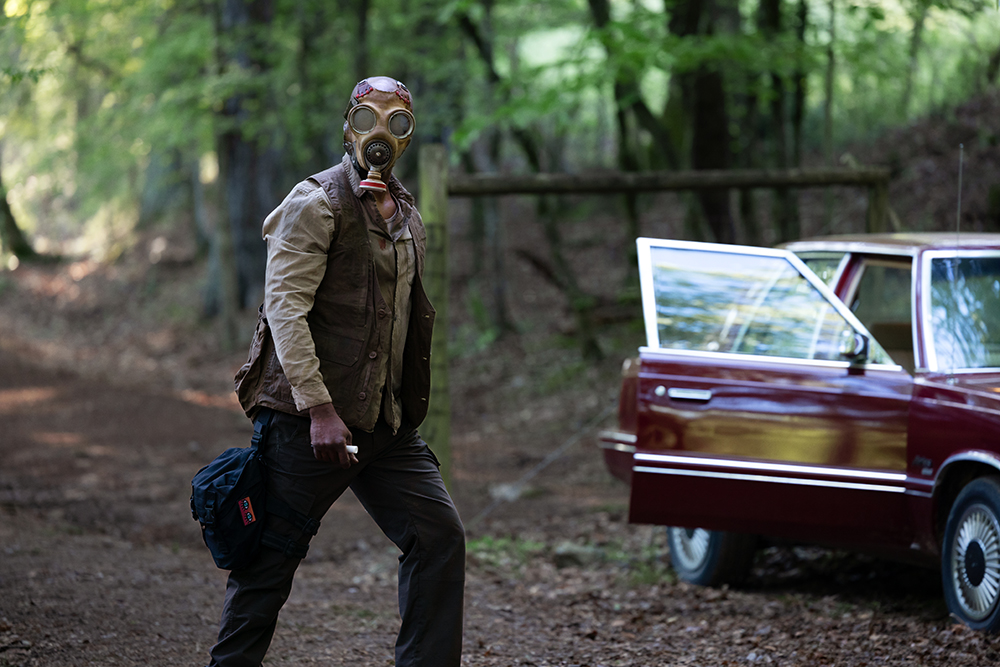
The pacing of the show follows a standard mystery-box structure—McCulloch teases out clues and slowly reveals the alien threat over the course of the season. Arlo, the youngest Chenoweth, becomes the focal point for this invasion after encountering a possessed woman in the woods. He returns home altered, with his glowing eyes and cryptic utterances signaling that something has latched onto him. From here, the show dives into familiar genre territory, combining paranoia, body horror, and existential dread, as the Chenoweths and their neighbors realize they are trapped and must work together to uncover the mystery behind the gas-masked man’s warning.
What sets Teacup apart from other genre fare is its stellar ensemble cast, who manage to elevate the often thin, trope-filled script. Yvonne Strahovski, best known for her Emmy-nominated role in The Handmaid’s Tale, anchors the series with her portrayal of Maggie Chenoweth. Strahovski is particularly adept at portraying characters with a strong exterior who are emotionally unraveling underneath, and here, she shines as a mother who must remain composed for the sake of her children while facing overwhelming terror. Her performance in the later episodes, where Maggie’s protective instincts clash with the fear and uncertainty of the situation, gives the show much-needed emotional weight. The subtleties in her performance—whether it’s her calm but firm instructions to her family or her quiet breakdowns—ground the often fantastical plot in real, human stakes.
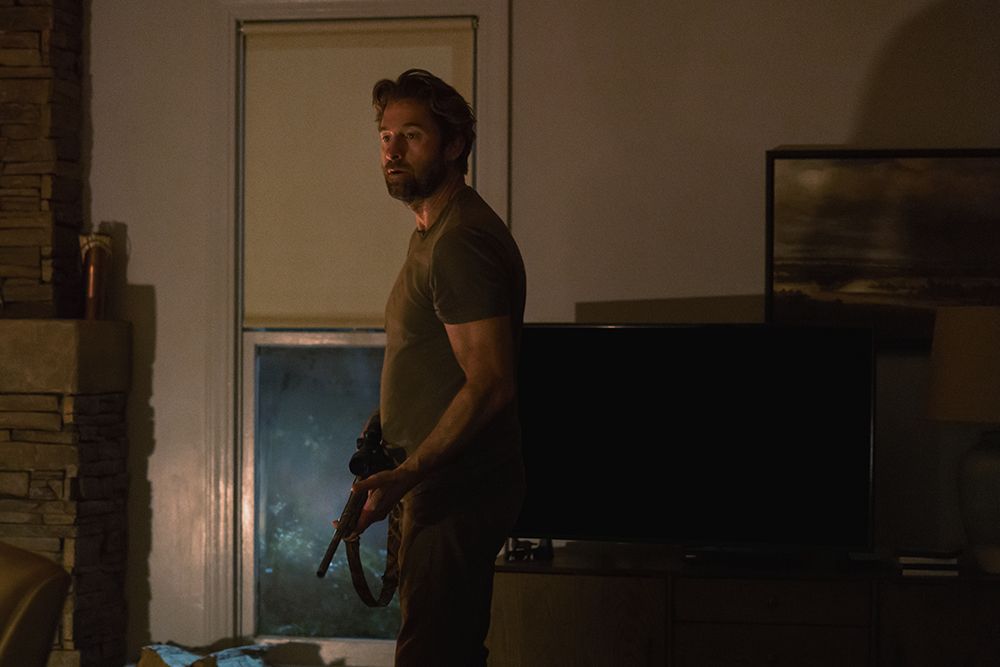
Scott Speedman, as James Chenoweth, plays his role as the guilt-ridden husband with a kind of understated weariness. While the script doesn’t offer him much beyond his marital troubles and a few moments of bravery, Speedman manages to make James a sympathetic, if somewhat passive, figure in the overarching narrative. His chemistry with Strahovski is serviceable but underdeveloped, likely due to the series’ focus on the supernatural mystery rather than their relationship.
The supporting cast also delivers, particularly Chaske Spencer as Ruben Shanley, Valeria’s husband, and Rob Morgan as McNab, the enigmatic gas-masked figure. Ruben’s arc, which explores his own family secrets and his desire to protect his son Nicholas (Luciano Leroux), gives the show some of its more grounded moments. Spencer brings a quiet intensity to the role, particularly in scenes where the tension between him and James threatens to explode. Morgan’s portrayal of McNab is delightfully cryptic, balancing menace with a surprising vulnerability as his character’s motivations become clearer. His presence injects the show with much-needed urgency whenever the plot starts to sag.
The children, particularly Caleb Dolden as Arlo, play pivotal roles in the story. Arlo’s connection to the alien force that has descended upon the farm is central to the mystery, and Dolden does a commendable job portraying a child caught between innocence and otherworldly possession. His eerie transformation in the early episodes adds to the show’s unsettling atmosphere, though his role diminishes as the focus shifts more to the adults.
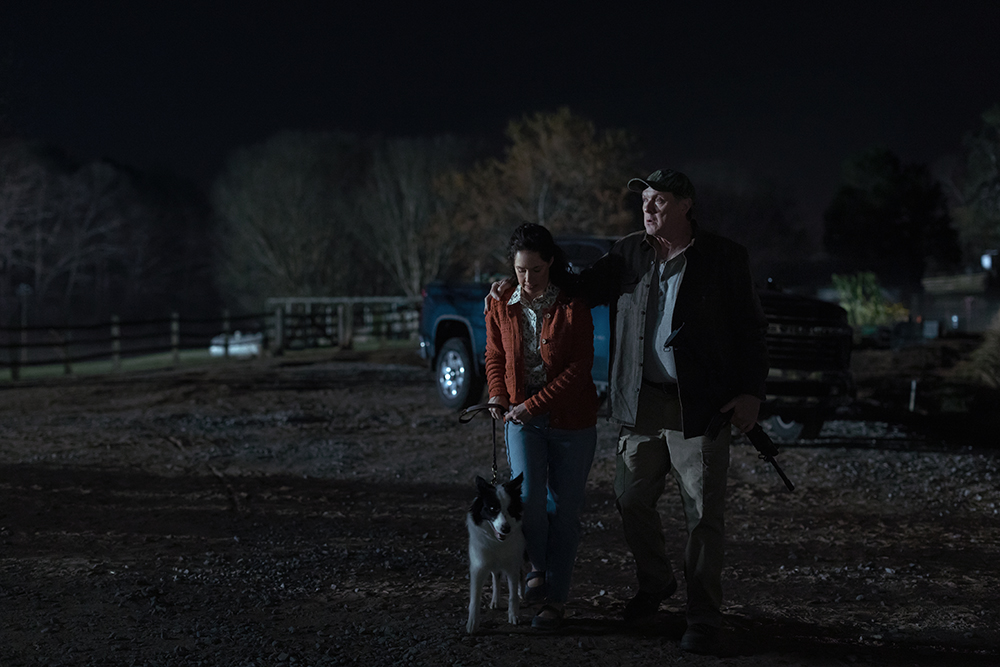
Visually, Teacup excels in building tension through atmosphere and well-crafted set pieces. The farm’s isolated, rural setting is used to great effect, particularly in the early episodes when the family’s sense of security begins to erode. The series takes full advantage of its confined setting, creating a claustrophobic feeling as the Chenoweths and their neighbors realize they are cut off from the rest of the world. The frequent power outages, malfunctioning technology, and eerie blue line that keeps them trapped evoke a creeping sense of dread, reminiscent of classics like The Thing and Invasion of the Body Snatchers.
The body horror elements are among the show’s most memorable features. The gruesome consequences of crossing the blue line—a rapid decay that turns people into ghastly statues—are both visually and viscerally horrifying. These moments stand out, offering a jarring contrast to the slower-paced character-driven scenes. The practical effects work is particularly strong, and the show doesn’t shy away from grotesque imagery, including decayed bodies, alien transformations, and creepy possessions.
However, as the series progresses, the initial horror elements give way to more conventional sci-fi territory. The alien invasion, which starts as a mysterious, looming threat, becomes more explicit, and while the show tries to maintain its sense of dread, it loses some of its early momentum. The ambiguity that worked so well in the first few episodes is replaced by more straightforward exposition, robbing the series of its earlier suspense.

At its core, Teacup explores themes of family, trust, and survival, with the alien invasion serving as an external metaphor for the internal conflicts within the Chenoweth family. Maggie and James’ crumbling marriage is paralleled by the larger societal breakdown caused by the alien threat, and the show tries to ask larger questions about who we can trust when everything falls apart. Unfortunately, these themes are often undercut by clunky dialogue and underdeveloped character arcs. The central tension between Maggie and James, while initially compelling, is sidelined in favor of the broader sci-fi plot, leaving their relationship feeling unresolved by the end of the season.
Similarly, the show’s social commentary—touching on themes of isolation, distrust of outsiders, and survivalism—feels superficial. While there are nods to the paranoia of living in a divided world, especially with characters like Donald Kelly (Boris McGiver), whose gun-toting, survivalist attitude is a clear critique of American individualism, these ideas are never fully explored. McGiver’s performance as Donald, though entertaining, veers into caricature at times, and the show misses the opportunity to delve deeper into his worldview.

The pacing is another area where Teacup falters. While the episodes are relatively short (most under 35 minutes), the middle stretch of the season feels sluggish, with too much time spent on exposition and not enough on advancing the plot. Episodes five through seven, in particular, drag as the show attempts to explain the alien invasion and the nature of the blue line. By the time the final episode arrives, the sense of urgency that characterized the early episodes has waned, and the climax feels rushed and underwhelming. The show’s reliance on familiar sci-fi tropes, particularly in the later episodes, also dilutes some of its initial originality.
Teacup is a series with a lot of promise. It features strong performances, particularly from Yvonne Strahovski and Rob Morgan, and its early episodes create a genuinely eerie atmosphere that keeps you hooked. The body horror and claustrophobic setting work well to build tension, and the show’s initial mystery is intriguing. However, as the season progresses, the series struggles to maintain its momentum. The pacing slows, the dialogue becomes repetitive, and the sci-fi elements, while interesting, overshadow the more compelling human drama at the heart of the story.
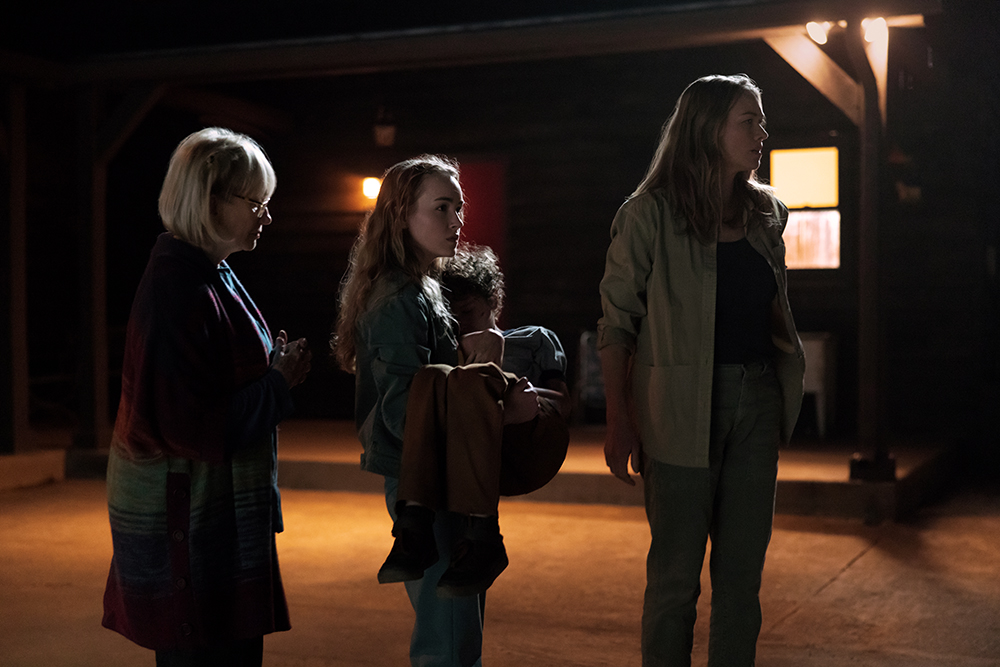
Despite its uneven execution, Teacup offers enough suspense, intrigue, and visual flair to make it worth watching, especially for fans of slow-burn horror and sci-fi. While it doesn’t fully capitalize on its potential, it lays the groundwork for future seasons, leaving enough unanswered questions to keep viewers interested in what might come next. Whether it can maintain that interest will depend on whether it can refine its storytelling and find a better balance between its character-driven drama and its supernatural thrills.
Synopsis :
On an isolated ranch in rural Georgia, several people are forced together to face a mysterious threat.
Teacup
Created by Ian McCulloch
Inspired by Stinger by Robert R. McCammon
Showrunner Ian McCulloch
Starring Yvonne Strahovski, Scott Speedman
Executive producers : James Wan, Ian McCulloch, Michael Clear, Rob Hackett, E. L. Katz, Francisca X. Hu, Robert R. McCammon, Yvonne Strahovski, Kevin Tancharoen
Production companies : Atomic Monster, Universal Content Productions
Network : Peacock
Release : October 10, 2024 – present

